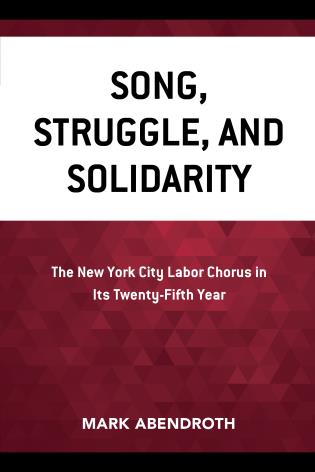Song, Struggle, and Solidarity: The New York City Labor Chorus in Its Twenty-Fifth Year
 Song, Struggle, and Solidarity: The New York City Labor Chorus in Its Twenty-Fifth Year (illustrated edition), by Mark Abendroth (Lanham, MD: Hamilton Books/Rowman & Littlefield, 2019)
Song, Struggle, and Solidarity: The New York City Labor Chorus in Its Twenty-Fifth Year (illustrated edition), by Mark Abendroth (Lanham, MD: Hamilton Books/Rowman & Littlefield, 2019)The New York City Labor Chorus has endeared itself to New York audiences for the past 30 years, since their exuberant debut at Moe Foner’s 1991 Bread & Roses Workers Culture Conference. (For their last number, chorus singers donned caps from the dozens of different New York City unions they belonged to.) Chorus members are generally all a pretty good age. Songs the chorus sings tell listeners stories of American labor they don’t want to be lost to memory. Song, Struggle, and Solidarity is an affectionate history of the NYC Labor Chorus. Author Mark Abendroth, an associate professor of education at SUNY Empire State College, was part of the chorus for six years. He shares highlights of their first 25 years of concerts, honestly confronts their challenges, and dives deep – song by song — into their triumphal 25th anniversary concert at the Skirball Center for the Performing Arts at N.Y.U.
The irrepressible Barbara Bailey, a force of nature in Communication Workers Local 1180, started the chorus. Her co-founders are social worker Bobbie Rabinowitz and fellow CWA 1180 member Laura Friedman. The founders’ goal for the chorus was to learn (and teach) the history of workers’ struggles through songs. In addition, they seek to revive songs neglected by commercial media.
Songs no longer lost to collective memory have been sung by the New York City Labor Chorus at stunningly prestigious events: Pete Seeger’s 90th birthday party at Madison Sq. Garden (sharing the stage with Bruce Springsteen, Joan Baez, and Dave Matthews), the Triangle Fire Commemoration (on the 100th anniversary of the tragic 1911 fire), the Abraham Lincoln Bicentennial gala concert at Riverside Church, the 1992 Democratic Party National Convention, and the bicentennial of the abolition of slavery, at the British Consulate. The NYC Labor Chorus has revived labor anthems on the stage of Carnegie Hall, the Great Hall of Cooper Union (sharing the stage with Ossie Davis and Ruby Dee), the Apollo Theater, Town Hall, the Central Park Summer Stage, the United Nations (for the first anniversary of the new South Africa), and at the Great Labor Arts Exchange in Washington, D.C.
The New York City Labor Chorus has taught labor songs to folk song enthusiasts while touring Sweden, in 1997, to Welsh choral singers, touring Wales in 2009, and they traveled to Cuba in 2011. Their pride and joy – and something they feature on their website – is their standing offer to sing on your picket line. Striking Citarella workers, restaurant workers at Ellen’s (Broadway) Stardust Diner, the Legal Services Staff Association, Con Ed workers, CWA workers, striking nurses, and many other embattled New York workers have received a singing boost from the chorus.
Author Mark Abendroth recounts the conductors of the New York City Labor Chorus who have built the reputation of the chorus. Jamaican-born Geoffrey Fairweather (and his accompanist Eustace Johnson) were the chorus’s original musical guides. Peter Schlosser took the baton from Geoffrey Fairweather — and was succeeded, in turn, by Jana Ballard. Abendroth praises his fellow chorus members, honing their craft with weekly two-hour rehearsals. He interviewed 28 chorus members to give a sense of how ordinary people – many of them retirees – can merge art with activism — and in so doing reach a great number of people. Abendroth’s 188-page Song, Struggle, and Solidarity: The New York City Labor Chorus in Its Twenty-Fifth Year takes you inside a chorus of working people that remains vital today, thirty years after its founding — and brings a jolt of joy every time it performs.
Reviewed by Joe Doyle, a retired New York City school teacher who has published articles and edited newsletters on maritime workers and their unions, Americans who fought in the International Brigades, Irish Americans, and Asian Americans.
